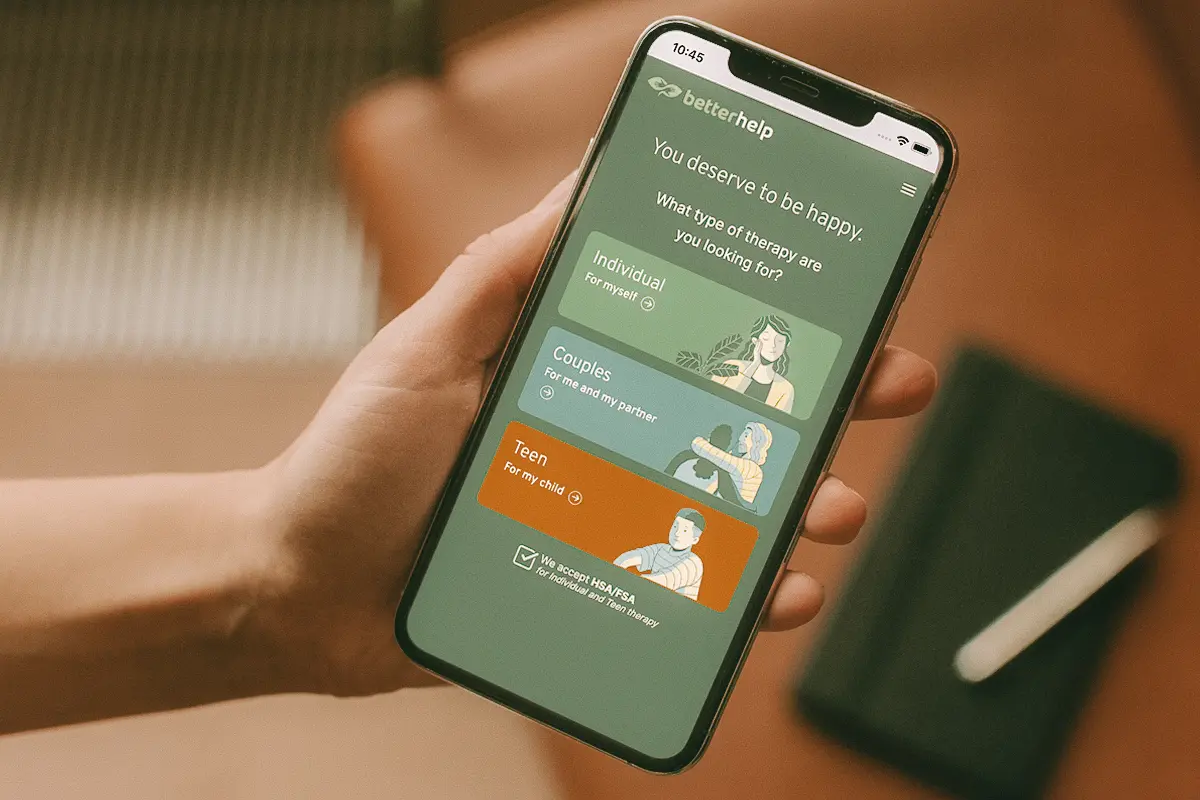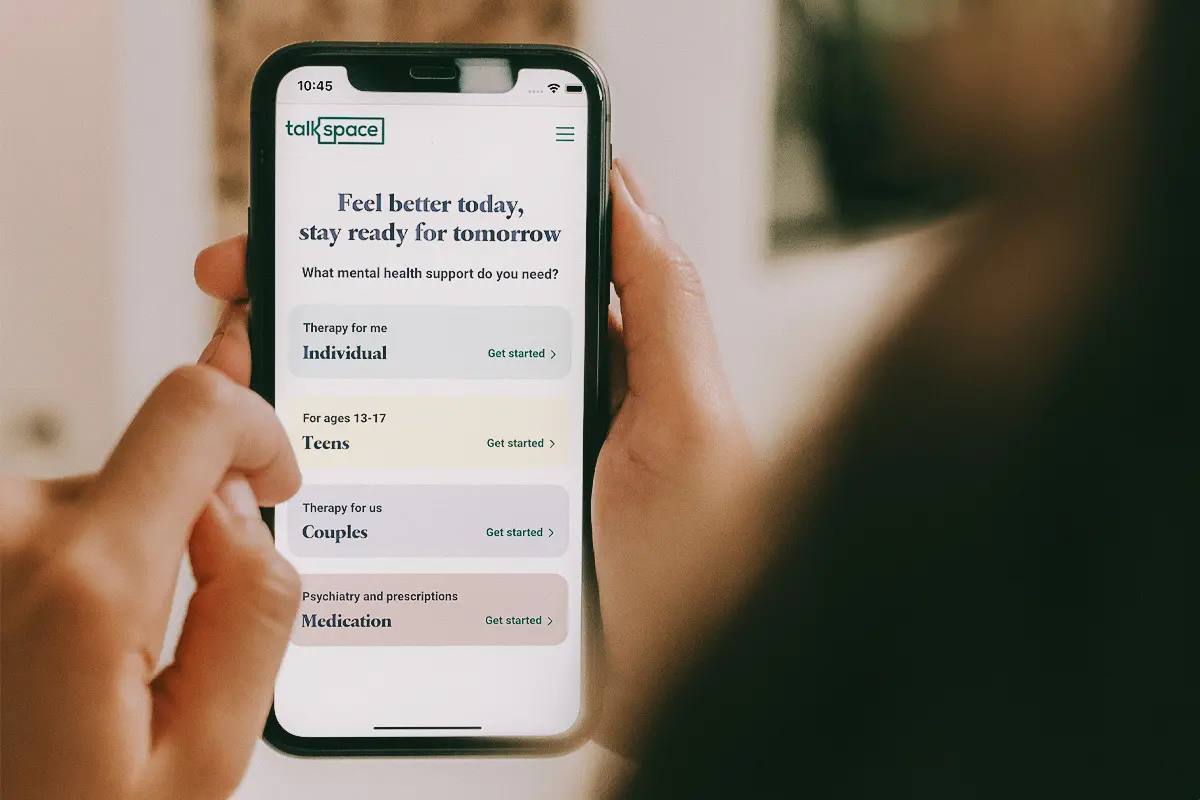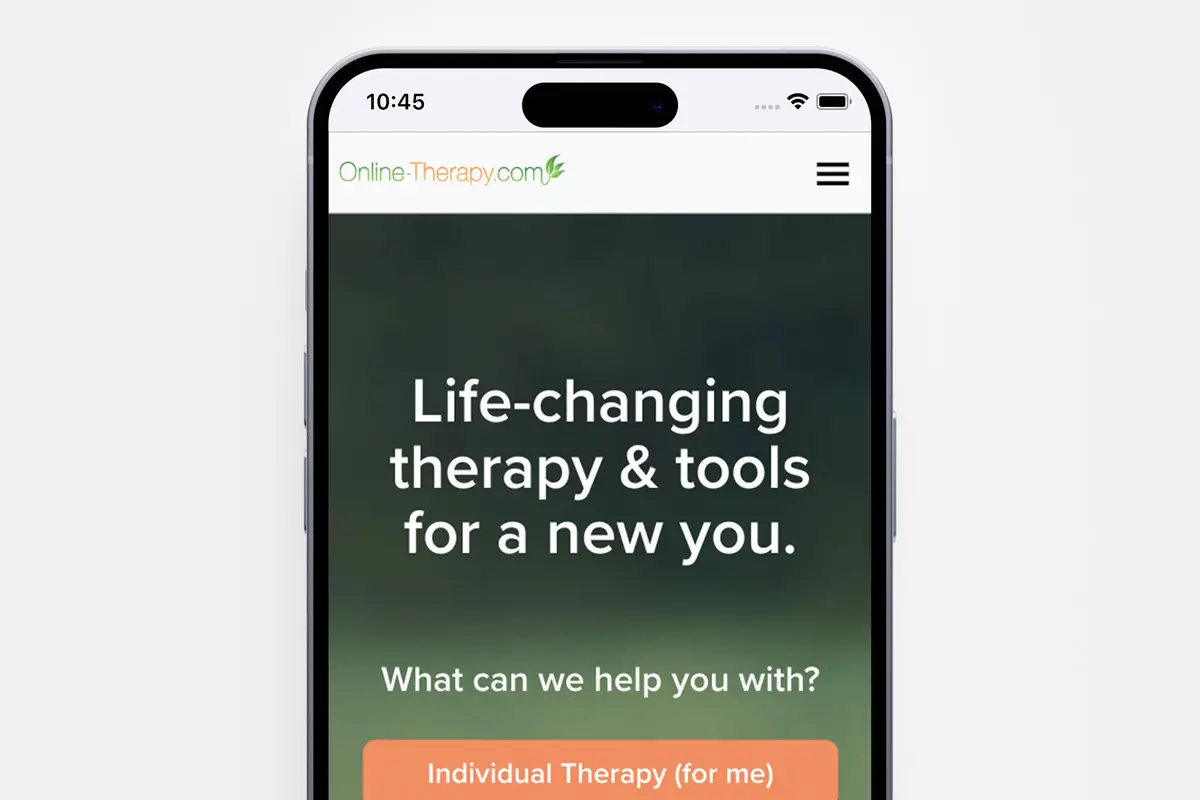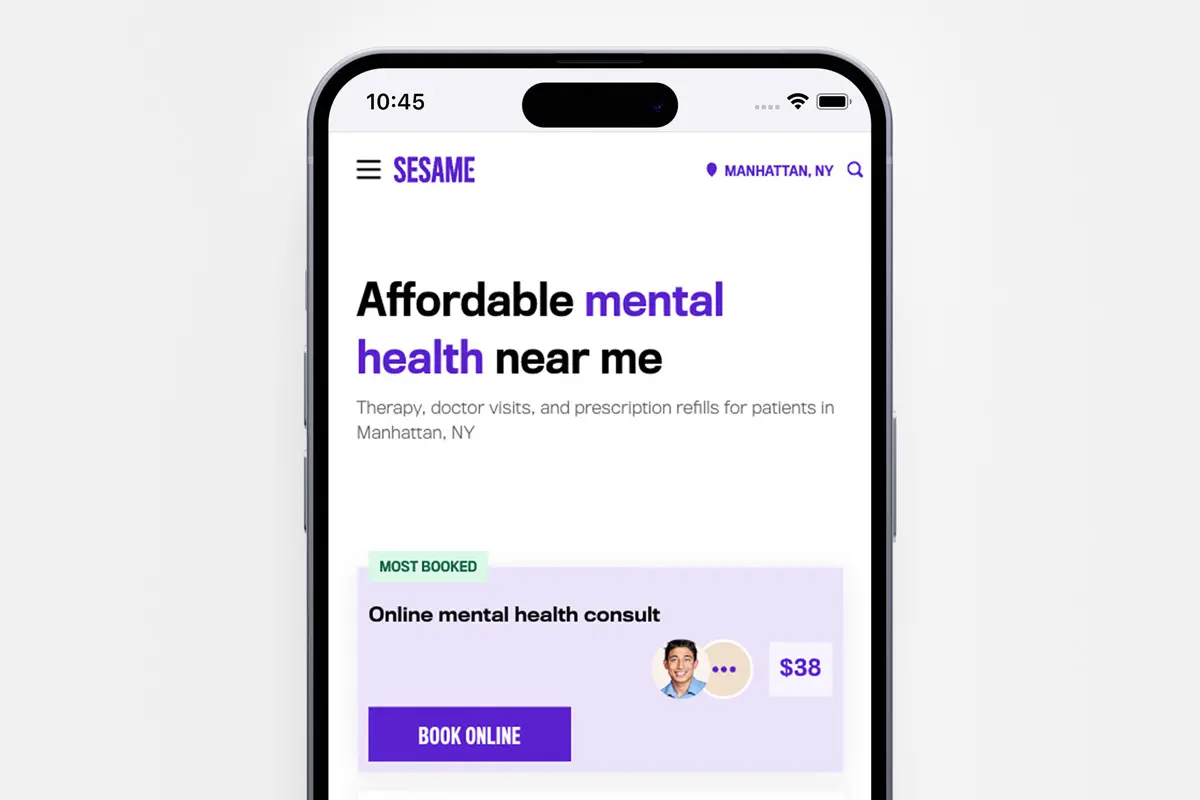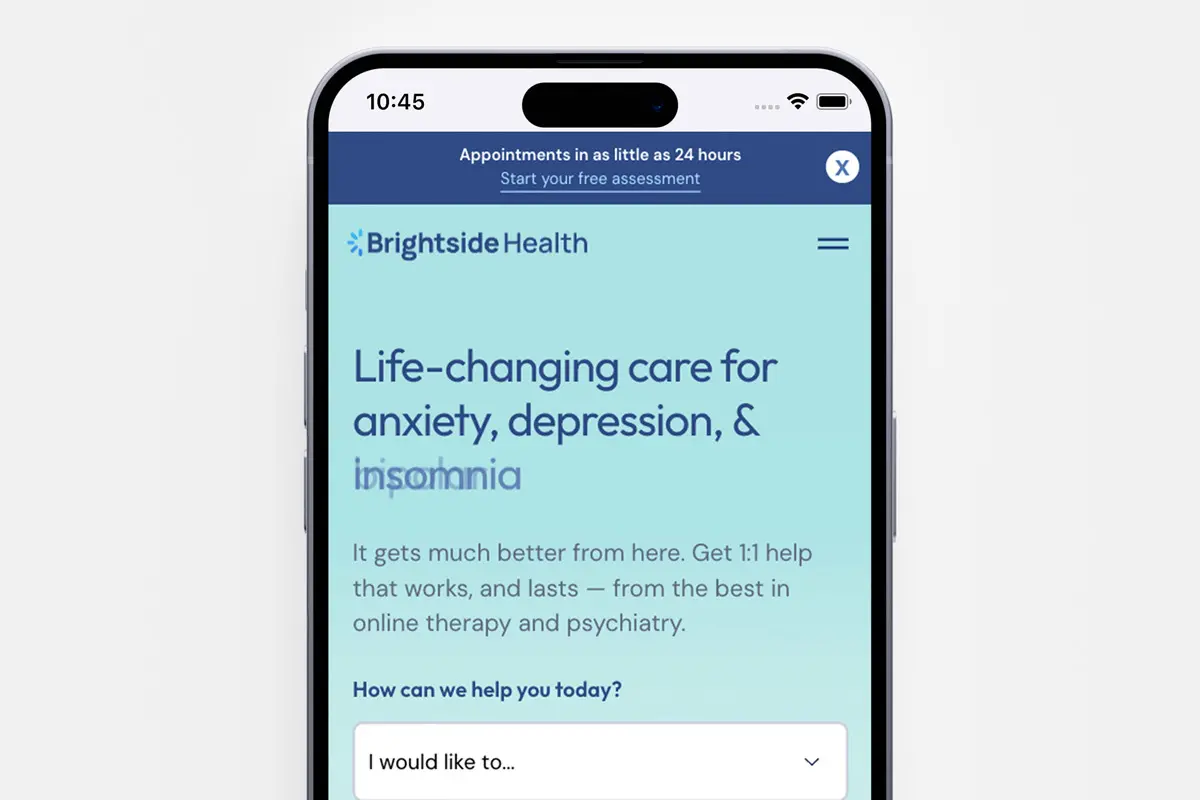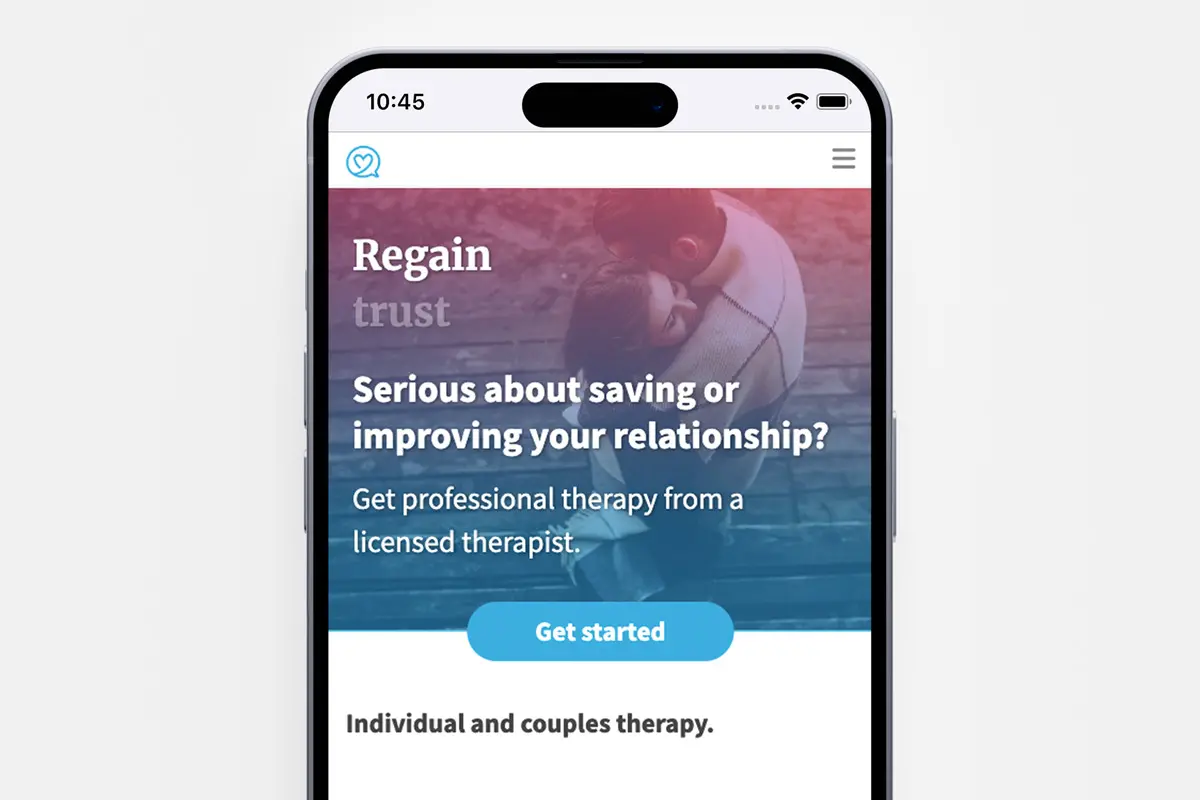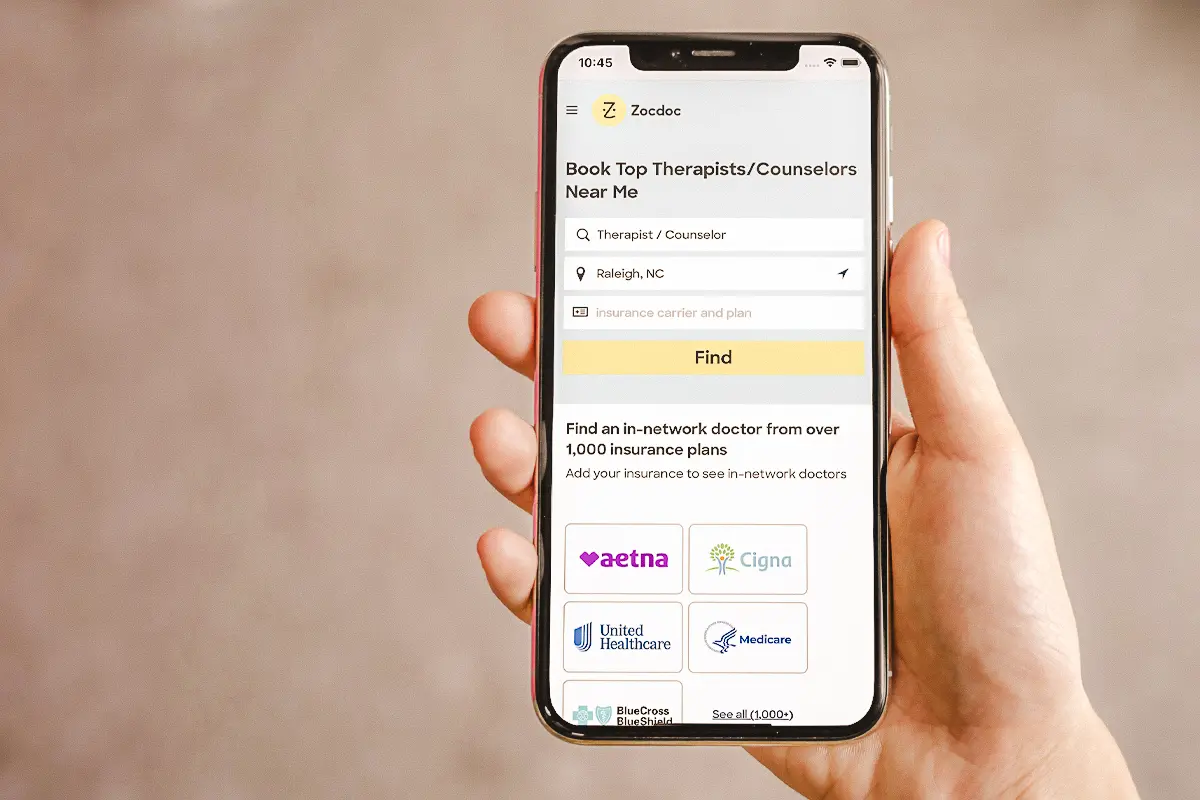Table of Contents
These products & services are researched and tested by HelpGuide’s independent consumer reviews partner. When you buy through the links, we earn a commission.
We know that getting access to affordable mental health care as soon as you need it has become, for some, an insurmountable task. Online therapy can help connect you to a licensed professional who can help—fast. When we did a quick search for therapists on Zocdoc, a telehealth directory, we found that there were a staggering seven times more online therapy providers compared to in-person therapy providers in the three largest cities in the United States (New York, Los Angeles, and Chicago).
Beyond expanding access to appointments, online therapy can make mental health care more financially accessible. In 2020, half (49.5 percent) of individuals with serious mental illness didn’t receive care because they could not afford it. Online therapy platforms make it easier to search for options that take insurance, offer low-cost appointments or financial aid, or have filters to search for providers that have sliding scale fees, which are lowered fees determined by the provider based on your ability to pay.
To help connect you with the best platforms, our Handbook team researched 70 sites, signed up and tested 14 excellent options, and narrowed our list down to the top seven that we recommend.
Which online therapy platform is right for you?

Consider whether the platform offers pay-per-session therapy or monthly subscriptions, how you want to connect with your provider, and how the platform helps you find the therapist that best suits your journey. We researched over 70 online therapy platforms and tested 14 of the most popular to help you choose from the best online therapy platforms.
Here are our top affordable online therapy platforms:
- Best overall: BetterHelp
- Best for using insurance: Talkspace
- Best for making lasting changes: Online-Therapy.com
- Fastest appointment time: Sesame
We recommend these platforms if you are looking for a specific type of care:
- Best for psychiatry and medication management: Brightside
- Best for couples: ReGain
- Best provider directory: Zocdoc
In a mental health emergency:
Online therapists may not be the most appropriate resource to help in a mental health crisis. If you or someone you know is a danger to themselves or others around them, it is an emergency, and it cannot wait for an online therapist’s response.
Don’t wait. You can find help immediately by:
- Calling or texting 988 for the Suicide & Crisis Lifeline
- Chatting online at 988lifeline.org
- Calling the Substance Abuse and Mental Health Services Administration (SAMHSA)’s Helpline at 1-800-662-4357 or texting your zip code to 435748
All the above options will connect you with trained professionals who can provide crisis support.
Why HelpGuide cares about access to immediate, affordable mental health care

It’s not hard to see why mental health is one of the World Health Organization’s basic human rights. Mental health affects our mood, thoughts, physical health, relationships, and everyday actions and reactions.
Mental health care can be a transformative experience for individuals. … Knowing who we are and learning to care for ourselves well allows us to live out healthy boundaries; feel fulfilled; engage in relationships in a healthy way; feel grounded, secure, and connected; practice our values consistently; and take steps towards a healthy life.
Jillian Zeitler, LPC at Mountainside Treatment Center in Canaan, Connecticut.
We believe that everyone should have access to mental health support when they need it. Access includes:
- Being able to afford mental health care.
- Being able to speak to a professional as soon as you want.
- Being able to connect with a professional who understands your experience and makes you feel seen and comfortable while you’re feeling vulnerable.
When the Handbook team analyzed public data about psychology professionals, we found that not all Americans have the same level of access to a therapist. Therapy deserts are regions where individuals have few or no choices in mental health care providers. In New York City, which has a population of 8.3 million, there were 38 licensed therapists for every 100,000 New Yorkers in 2023. In comparison, in 2021, the state of Texas had the second-highest population in the country at 29.5 million, but there were only 17 therapists for every 100,000 Texans. For a city with a population three times less than Texas, New Yorkers have twice as many therapists to choose from, schedule with, and get mental health care from.
Though therapy deserts are often in rural areas, people in large metropolitan areas may not always have easy access to therapy, especially when factoring in the time and commute needed to get there.
I was in such a low in my life, and I was living in Southern California. I can’t drive, it’s such a struggle here. Even going 20 miles sometimes takes an hour and a half. So, I cannot even think about going into an actual stereotypical office and couch for therapy. Absolutely not.
Focus group participant, online therapy user
Online therapy allows more individuals to get the mental health support they need. In our November 2023 survey of 600 online therapy users, 83 percent shared that these sessions were effective in addressing their mental health concerns.
There [are] clients that are agoraphobic or they have so much anxiety… and I’ve just seen some people that are just paralyzed, and so being able to seek therapy virtually is a godsend for them.
Focus group participant, therapist
Respondents expressed that they were more comfortable attending therapy at home, had more flexible appointment scheduling, and didn’t miss the commute to their provider’s office, among many other benefits of online therapy.

Collectively, our Handbook Team has put in more than 7,500 hours of research, testing, and evaluation to review online therapy platforms, down to the fine print. Mental health care is such a personal, impactful, and essential part of whole-person wellness. We wrote this review to guide you in finding a provider who can best support you in your mental health journey.
What you need to know about our online therapy research and testing
These are the five things you need to know about online therapy:
Our testing experience
The Handbook team researched more than 70 online therapy platforms, directories, and networks. Based on our research, we signed up for the top 14 platforms to test out for ourselves. Here’s what we did with each online therapy platform:
Testers explored the platforms and attended online therapy sessions for at least four weeks. Our testers were instructed to test the platforms through the lens of a real user, paying attention to how easy or difficult it was to find a therapist they could talk to. Testers logged their experience in a diary and came together to share their findings when testing concluded.
We learned that most testers felt the need to switch providers, especially the ones testing platforms that initially matched users to their providers. Our challenge was to test and evaluate the features and experience of the platforms themselves rather than the care from individual providers. We were surprised when we encountered the lack of choice in providers on some platforms. For example, when our Calmerry tester was looking for a provider of color in their state, they were given three choices, none of whom matched the tester’s preferences.
From our tester
“I was only given three [therapist] options and still couldn’t get the type of therapist I was looking for. When I didn’t find the therapist I was looking for, I felt unseen and underrepresented. Often, I’m reminded that I am a minority due to the lack of representation of someone who looks like me. This was just another example of that.”
Still, we were pleased that most of our testers had positive interactions with the providers they chose. “I’ve been through many therapists before, but I was surprised when I found a therapist who specialized in my concerns and had a different approach to therapy,” said one tester. “I learned a new perspective to frame my ongoing concerns and got to connect with a caring provider that I felt comfortable with.”
We rated each online therapy platform we tested based on our findings and chose our top seven to share with you in this review.
Compare the best online therapy platforms of 2023
| Platform | Services | Ways to Connect | Monthly Cost for Individual Therapy | Learn More |
|---|---|---|---|---|
| Individual therapy | Messaging; Text, audio, or video sessions | $260–$360 | Visit Site | |
| Individual therapy; Couples therapy; Teen therapy; Psychiatry | Messaging; Text, audio, or video sessions | $276–$436 | Visit Site | |
| Individual therapy; Couples therapy | Messaging; Text, audio, or video sessions | $200–$440 | Visit Site | |
| Individual therapy for adults; Couples therapy; Psychiatry | Audio or video sessions | Depends on provider | Visit Site | |
| Individual therapy for adults; Psychiatry | Messaging; Video sessions | $300–$352 | Visit Site | |
| Individual therapy; Couples therapy | Messaging; Video sessions | $260–$360 | Visit Site | |
| Individual therapy; Couples therapy; Psychiatry | Audio or video sessions | Depends on provider | Visit Site |
The best online counseling reviews
BetterHelp: Best overall
In our October 2023 survey of online therapy users, BetterHelp users had the highest satisfaction rates with their therapists. Eighty-six percent of respondents rated their therapists as good or very good—that’s almost 9 out of 10 BetterHelp users we surveyed.

Finding a therapist you feel comfortable with can help you get the most out of your therapy sessions. “Having a good rapport with your therapist and being provided with a safe, non-judgmental space is a critical part of the therapeutic process,” explains GinaMarie Guarino, therapist and founder of Psychpoint in New York City. “Feeling seen, understood, and accepted without judgment creates a space for healing, so it is very important to feel seen by your therapist.”
BetterHelp says that it has more than 30,000 licensed therapists on the platform. Our Handbook Team tester went through the therapist matching and switching process to find out how easy it was for users to find a good therapist fit. Here are a few of the features we found that can help you find the right therapist:
- A therapist-matching questionnaire that considers your gender identity, sexual orientation, areas of focus, and therapist expectations.
- Ability to chat with your therapist to get to know their approach before booking an appointment.
- Easy process to switch therapists anytime.
- Ability to choose a new therapist based on a list of matches.
Our tester was especially impressed by the bonus features you can explore to support your therapy journey outside of interactions with therapists. “It’s cool that you can keep a journal and choose whether or not to share it with your therapist,” said one tester. “You can also set goals with your therapist, and there are so many classes to choose from to supplement your experience.”
A BetterHelp subscription also includes:
- A digital journal
- Group sessions and webinars
- Worksheets (assigned by your therapist)
BetterHelp
Our verdict: BetterHelp offers an online therapy subscription with a wide selection of therapists, a process that makes it easy to switch providers, and useful extra features like a digital journal. In our survey, BetterHelp users were happier with their therapist matches compared to other platforms.
Talkspace: Best for using insurance coverage
Talkspace is one of the few online therapy platforms that accept insurance. Its providers are in-network with major insurance plans such as Aetna, Cigna, and Optum, and our testers found it easy to find out how much you’ll have to pay for therapy on the platform without having to sign up for an account first.
About one in two of our October 2023 survey respondents (49 percent) paid for online therapy using their insurance coverage. Without insurance, Talkspace had the highest per-session costs for its Video + Messaging Therapy plan at $99. However, if covered, a Talkspace session could cost as low as a $22 copay per session (for Carelon members, according to the Talkspace website).
We found that if Talkspace verifies your coverage, but its providers aren’t in-network with your insurance plan, the platform will still offer a discount of $120 off your first month.
Our Talkspace tester had a similar experience to our BetterHelp tester with finding the right therapist fit. The platform matches you with therapists in your state according to your concerns and gender preferences. When switching therapists on Talkspace, you can see a detailed profile of your therapist matches. Therapist profiles included information such as:
- Name.
- License information.
- Video introduction.
- Short biography.
- Areas of focus.
- Experience level.
- Therapist availability, including working days, upcoming time off, and times they’re most likely to be active on the platform.
We liked that the provider profiles had enough details to help our tester choose a therapist who supported their concerns and had availability that worked for their schedule.
From our tester
“Although my first match didn’t work out, I liked that Talkspace showed when my therapist matches were more likely to be active so that I could pick someone who could answer my messages during the evenings when I was more available.”
Talkspace also provides psychiatry services. Though its out-of-pocket fees for psychiatry and medication management can add up, Talkspace psychiatry can still be a cost-effective option if you have an in-network insurance plan.
We want to highlight that the New York City Health Department offers free mental health support for New York City teens on Talkspace through a program called NYC Teenspace. As of this writing, teens ages 13 to 17 can get Talkspace’s Video + Messaging Therapy plan for free until they turn 18. Teens can sign up for the platform with their parents’ permission and have access to the Talkspace Go app, which has interactive lessons and exercises for teens.
Our Verdict
Our verdict: It’s worth checking if Talkspace is in-network with your insurance plan. If you’re covered, you could find Talkspace a more affordable online therapy or psychiatry option. We liked its detailed therapist profile features, and that messaging therapy is included with all plans.
Online-Therapy.com: Best for making lasting changes
We found that Online-Therapy.com offers the most resources outside of therapy for you to learn about behavioral change and, more importantly, to put it into practice. In addition to unlimited messaging and the option for live sessions with your therapist, the platform includes lessons with worksheets, a digital journal, an activity planner, yoga videos, and meditation videos with all their plans.
Online-Therapy.com specializes in cognitive behavioral therapy (CBT), which is a treatment approach that identifies unhelpful patterns of thinking or behavior, teaches people coping skills, and encourages a shift to more helpful behaviors and thoughts. We liked that the platform’s therapists are trained in delivering CBT, and its resources are geared toward helping individuals stay accountable to their goals for behavioral change.
CBT is well-researched in treating individuals with depression, anxiety, obsessive-compulsive disorders, and addictions. Ling Lam, a licensed therapist and academic lecturer at Santa Clara University, explains that one of CBT’s strengths is how it leverages intentional practices like the activities assigned outside of therapy sessions. “I think journaling, CBT worksheets—these are important parts of any therapy, CBT or not.”
Since CBT relies heavily on your own initiative in making the changes, we recommend Online-Therapy.com if you are ready to make changes and could benefit from the many resources the platform offers to support your therapy goals.
Online-Therapy.com offers financial aid for those who qualify. Our tester found the application and approval process quick and straightforward. In our focus group of online therapy users, one participant told us, “I had to apply for financial aid on Online-Therapy.com to actually get the plan I’m currently on, which was 30% off. It was really a good deal for me.”
Our Online-Therapy.com tester had to switch from their first provider match because of poor availability. They found it easy to switch but didn’t find many provider options once they searched for therapists with expertise in a certain area. Although our tester had a positive experience with the provider they chose, this clinician didn’t mention the extra resources like the worksheets and digital journal, and our tester had to explore these for themselves.
Online-Therapy.com
Our verdict: Online-Therapy.com includes an abundance of features with each membership to help you work on what you learn in therapy. These features are all informed by CBT to support you in changing behaviors or patterns. However, your experience may vary depending on how your therapist uses them in your sessions, and you might have to seek them out for yourself.
Sesame: Fastest appointment times
Sesame Care, or Sesame, is a telehealth platform that has providers with same-day availability and an easy signup process that quickly connects you to mental health care. We know how important it is to get mental health care when you need it. According to one survey, the national average wait time for therapy services is 48 days, almost seven weeks. Getting an appointment with a psychiatrist can take even longer.
Warning
If you need help urgently, don’t wait for an appointment. Crisis care is available to support your mental health immediately. Call or text 988 to connect to the Suicide and Crisis Lifeline, available 24/7.
Online therapy on Sesame can also be a good choice if you prefer to browse and choose from a therapist based on their profiles instead of getting matched with one. We liked that Sesame has clear provider profiles and availability schedules so you can choose the best provider for you.
However, the number of licensed providers available on Sesame varies by location. Depending on your state, you may have a different level of choice regarding provider availability. For example, as of this writing, users in Vermont can choose from 11 providers, whereas users in Alaska only have two providers to choose from.
Our tester found it easy to search for a variety of online mental health care providers in their area using Sesame. Providers are organized according to the services they offer, including online mental health consults, online couples therapy sessions, online therapy sessions for new patients, prescription refills, and online psychiatry consults. Each provider’s profile includes a schedule of the earliest available appointment times. Sesame also features a tool to filter your results for providers you can see within two hours, though this was only available on the mental health consult and prescription refill options for our tester.
When searching in Charlotte, North Carolina, on a Sunday night, our tester found online mental health consult and prescription refill appointments available that same night, some in under an hour. There were five providers in our tester’s area for therapy appointments, and one had open appointment times the next day. The others had appointments available on Tuesday, Wednesday, and Friday that week. While only one provider was listed for online psychiatry consults in the area, they had appointments available the next morning starting at 10:00 a.m.
It can be hard to commit to a monthly subscription if your budget changes from month to month. Sesame can be a good choice if you want a no-frills experience with live online therapy sessions. Appointments are booked and paid per session, so you’re not locked into a monthly subscription. But since you’re only paying for provider sessions, the platform doesn’t offer extra mental health resources like digital journals or extra learning. Sesame does offer post-visit messaging with certain providers. This feature is only available with providers who choose to participate and is limited to four days of messaging after your visit for $19.
Sesame
Our verdict: Sesame can quickly connect you to online therapy and psychiatry services with same-day appointments, but provider availability can vary by location. Its pay-per-session structure can make online therapy more accessible for flexible budgets.
Brightside: Best for psychiatry and medication management
For some, a combination of therapy and psychiatry can be more beneficial than just therapy alone. While psychiatrists can prescribe and help you manage medication, therapists cannot. But, having both a psychiatrist and a therapist can mean coordinating your appointments between two separate offices. Brightside Health, or Brightside, is an online mental health platform that offers a plan that combines therapy and medication management through psychiatry. We liked that Brightside integrates mental health providers on one platform, and you can message your providers anytime.
Your provider’s notes can be shared with any other providers on the platform, so switching therapists or between your therapy or psychiatry providers is a seamless experience.
From our tester
“When I had my first meeting with my new therapist, she was able to access notes in my account to see what I had been working on in the past. It was nice not to have to start from scratch with a new therapist, which can sometimes be overwhelming when trying new providers.”
Similar to Talkspace and BetterHelp, our testers found that Brightside first matches you with a provider. If you want to switch providers, you’ll have to request one through customer service, which may give you a few therapist bios to choose from. We didn’t like this process as much as being able to view provider profiles ourselves, but we still liked having the choice. Testers were able to switch providers at any time and found Brightside customer service very helpful in the matching process.
We had a positive experience with the platform’s app, particularly the tracking and learning features that came with their Brightside subscription. One tester found the library of self-care videos helpful to watch in between sessions to work on managing their anxiety and stress.
“The app is such a great feature,” said the tester. “It has charts that help you track your anxiety and stress levels and offers easy access to book and join appointments. It also has a Resources section with short self-care videos to help develop tools to manage feelings and resources for crisis situations if needed.”
Brightside providers are in-network with some insurance plans, including Medicare Part B. However, we found it a bit of a hassle to sign up for an account first to see whether our plan was in-network.
Brightside
Our verdict: We liked that Brightside integrates therapy and psychiatry on one platform. The care coordination and customer service were responsive and helpful, and its providers are in-network with some insurance plans, including Medicare Part B.
ReGain: Best for couples
ReGain is BetterHelp’s platform specifically for relationship therapy. It offers live therapy sessions for couples and a running schedule of group webinars called “Classes.” We liked the webinars because partners can learn more about relationship skills such as communication, conflict resolution, and parenting, which can make therapy more effective.
We learned that group-based resources were important to people seeking relationship therapy online. In our October 2023 survey, about one in three ReGain users felt that group-based activities (e.g. group therapy, workshops, or support groups) were essential to their online therapy experience.
Experts explain that group learning can help you feel more prepared to take advantage of your therapy sessions. “If clients were better prepared and informed, then therapy would be more effective,” says Lincoln Stoller, a professional counselor and founder of Mind Strength Balance in Victoria, British Columbia, Canada. “Most new clients don’t know what to expect [from therapy] and have not organized themselves.”
Classes are interactive, meaning attendees can ask questions and participate in discussion periods along with the lessons. There is often more than one class scheduled in a day, and they’re organized under the following topics:
- Anxiety & Depression
- Skill Building Series
- Relationships
- Wellness
- LGBT
- Grief
- Trauma
- Anxiety
- BetterHelp
- Anger Management
- Substance Abuse
Our testers liked that they were able to get an appointment quickly (within one to three business days) and that most therapists on the platform had evening hours. This was convenient timing for testers who work and have children. Testers put their children to bed and logged on to do therapy at 7:45 p.m. and 8:30 p.m. on weekdays.
The first therapist one testing couple was matched with was not a good fit, but the second therapist was a great fit. The testers noted that both of them felt heard and that the therapist provided some interesting ideas to help them reconnect.
ReGain is BetterHelp’s platform specifically for couples therapy. Though its plan costs are in the same range as BetterHelp, a ReGain subscription gives you and your partner access to four monthly live sessions and unlimited group sessions. You and your partner each have a separate login and digital journal, but you have a shared chat room with your therapist.
ReGain
Our verdict: ReGain offers couples therapy and extra learning sessions for partners in the form of group webinars. We found the webinar topics to be wide-ranging and scheduled often enough for busy couples to be able to attend.
Zocdoc: Best provider directory
We liked Zocdoc because its provider search tool was one of the easiest for our testers to use and filter for the right provider for them. You may be looking for a provider of a certain gender identity, who speaks a certain language, or who is in-network with your specific insurance plan.
Our testers found it easy to get started with Zocdoc. Unlike the other online therapy platforms we researched, you don’t have to sign up for an account to use the search tool. For therapy, Zocdoc asks a few questions about your location and the type of therapy you’re looking for. You can filter your search results further using the following categories:
- Preferred appointment date.
- Preferred appointment time.
- Visit reason.
- Specialty.
- Distance (If you’re looking for in-person therapy).
- Type of visit (Whether it’s a virtual video visit or an in-person visit).
- Gender.
- Patient age range.
- Modality (Couples, individual, family, or group therapy).
- Provider ethnicity.
- Provider languages spoken.
- Provider sexual orientation.
- Provider faith.
- Treatment approaches.
Zocdoc was the only one of our top platforms that had a way to filter providers by both sexual orientation and ethnicity. We think it’s important to have the ability to choose a provider that makes you feel seen and comfortable sharing your experiences.
I wanted someone who could connect with me culturally. Because I think there’s just a lot of things that I feel like that therapist would maybe understand that maybe someone that isn’t from my culture wouldn’t. So I wanted that choice.
Focus group participant, online therapy user
In our October 2023 survey, online therapy users indicated that affordability, positive reviews, and insurance coverage were among the top deciding factors when choosing an online therapy platform. We found it helpful that provider profiles displayed information such as user reviews, in-network insurance plans, and whether providers offered sliding scale fees. But we also noticed that not all providers have their out-of-pocket fees on their Zocdoc profiles.
Although providers on Zocdoc may also have same-day availability, we found that the time to confirm your appointment wasn’t as quick as on Sesame. After making an appointment through Zocdoc, the provider reaches out (typically via email) to confirm your appointment again. Because of this extra step, we found that sometimes providers weren’t available at the requested appointment times as shown on the platform.
Zocdoc
Our verdict: Zocdoc has a detailed search tool with filters to help you find a provider you’re comfortable with and who accepts your insurance. Though the platform shows provider availability, you’ll still need to wait for the provider to confirm your appointment through email, which can add to your wait.
Pros and cons of online therapy
What we like about online therapy platforms
- Choose and switch therapists easily.
- Attend from a comfortable space of your choice without the commute.
- No need to travel to a provider’s office.
- Option to message your therapist in between sessions.
In the comfort of my home, I can be vulnerable. If I were to go into an office, it would feel kind of fake for me. Like I have to be aware of my surroundings, I have to develop this relationship. There’s so much pressure. But because it’s been online, I felt like there’s this new layer to myself where I’ve just felt more humble, more honest with myself.
Focus group participant, online therapy user
What we don’t like about online therapy platforms
- Need to find a suitable space and a strong internet connection to attend sessions.
- Online therapy sessions tend to be shorter than face-to-face sessions.
- Data privacy concerns with any digital platform.
- Not right for people uncomfortable using technology.
I think just having accessibility, especially for your rural areas … [online therapy has] been positive. I think the only negative could be technology, just because if they are in a rural area, their internet isn’t always the most stable.
Focus group participant, therapist
What is online therapy?
Online therapy, also known as virtual therapy or online counseling, is a way to receive therapy virtually on your mobile device, laptop, or personal computer. To attend an online therapy session, you need an internet connection, a device with a microphone and camera, and a safe and quiet space.
Different types of online therapy

Online therapy platforms may offer the following ways to connect with your therapist:
- Messaging: Like a text exchange, you and your therapist can leave and reply to text, audio, or video messages in between sessions.
- Live text sessions: A session where you and your therapist communicate through text only.
- Live audio sessions: A session where you and your therapist communicate through a phone or audio call.
- Live video sessions: A session where you and your therapist communicate through a video conference call via an app, browser, or video conference program.
Handbook tip 1
When setting up a space to attend online therapy, look for a quiet, comfortable, private environment with a reliable internet connection. Online therapy sessions are typically 30 to 45 minutes, so set aside a block of time when you won’t be disturbed.
Online therapy costs
The cost of online therapy can vary widely. Depending on whether you’re using your insurance coverage or paying out of pocket, prices can span from a $10 copay to $300 per session.

For subscription-based online therapy platforms, we found that a weekly session costs $81 on average. In Minnesota, the average 30-minute in-person counseling session cost patients $166 out-of-pocket. This is double the cost compared to the average per-session price of online therapy platforms.
An average monthly subscription with four live sessions costs $325 per month, almost as much as the average American spent on food outside of home in 2022, $303 per month.

Online therapy subscriptions can cost less than the average if you’re not as interested in weekly live sessions with your therapist. You can save 30 to 40 percent if you opt for the messaging-only plans from Talkspace and Online-Therapy.com, compared to plans with weekly live sessions.
What to look for in an online counseling service
Here’s what to look for when choosing an online therapy platform:
Licensed therapists
As a bare minimum, any mental health professional conducting therapy should have an active license in good standing and adhere to standards in privacy and confidentiality. All the platforms we recommend have licensed therapists delivering mental health care. When matched with a therapist, you should be able to look up their active licenses through their respective state board.
Affordable pricing
In addition to being easily accessible from the comfort of your own home, online mental health care should be financially accessible. The most common reason our October 2023 survey respondents stopped using online therapy was because it was too expensive. Whether it’s a subscription, a per-session cost, or a list of in-network insurance plans, online therapy platforms should provide clear information about how much a user can expect to pay.
Handbook Tip 2
If you’re experiencing a higher financial burden, we recommend contacting customer service to see if financial assistance programs are available and how to qualify. Our testers were able to get help finding and applying for financial aid after we reached out to customer service.
Specific training or experience
Providers may have additional certifications if they are trained to support certain populations. For example, CAMS-certified therapists are trained in the Collaborative Assessment and Management of Suicidality (CAMS) framework and are able to support individuals who are at risk of self-harm and suicide.
Online therapy platforms may also match you to mental health professionals who specialize in treating certain populations. We preferred when online therapy platforms asked about our testers’ provider preferences. This could include preferences for gender identity, sexual orientation, faith, languages spoken, or racial identity.
Availability
Finally, online therapy platforms should have therapists available to meet with you according to your schedule. We preferred platforms that displayed provider availability so our testers knew if they could get started with therapy as soon as possible.
Data privacy on mental health platforms
Conversations between you and your mental health care provider can be very personal and sensitive. In our October 2023 survey of online therapy users, about three in four (77 percent) of respondents said that the digital privacy of an online therapy platform was extremely or very important to them. Online therapy platforms have a responsibility to safeguard their users’ data in the following ways:
- Health care providers are responsible for protecting your personal health information (PHI) under HIPAA.
- Platforms aren’t allowed to sell or use your PHI for marketing purposes without your permission under the Health Information Technology for Economic and Clinical Health (HITECH) Act.
What’s covered by HIPAA?
The HIPAA Privacy Rule protects your PHI from being disclosed to other parties to ensure your privacy. Your PHI can include your name, zip code, birth date, and contact information, collected from your medical record and used to make your health care decisions.
Although the information shared between you and your online therapy provider may be considered PHI, data collected by the online therapy platform may not be. In contrast to PHI, personally identifiable information (PII) can still be the same information—your name, date of birth, zip code, etc.—but it’s not covered under HIPAA. PII can also be data collected through questionnaires (i.e., onboarding questionnaires for online therapy platforms), which may be disclosed to third parties with your consent.
How your data is collected and used can be outlined in a Terms and Conditions agreement, Privacy Policy page, or a website disclosure. Many sites have Terms and Conditions that assume your consent to data collection simply by using its website, but some online therapy sites we visited had a popup asking you to acknowledge their data-sharing policy.
Your PII is protected under the Privacy Act of 1974 from being disclosed without your consent. Unlike the HITECH Act, there currently aren’t any laws that regulate the collection and sale of PII by private companies like online therapy sites. The Federal Trade Commission (FTC) is a federal agency that enforces laws that protect consumers’ privacy.
Despite this, data privacy concerns have been raised about major online therapy platforms like BetterHelp and Talkspace, namely for disclosing users’ personal data to advertisers without users’ consent. In July 2023, BetterHelp settled with the FTC and agreed to pay $7.8 million to affected users, among other remedial steps to protect user data. When we reached out to BetterHelp, the company clarified that it is not regulated by HIPAA because they are not a covered entity—a health plan, health care clearinghouse, or a health care provider. BetterHelp states that its platform is now certified by the Health Information Trust Alliance (HITRUST), a health industry data security program, and that all messages between you and your therapist are encrypted using 256-bit encryption.
According to the Mozilla Foundation’s *Privacy Not Included, Talkspace updated its privacy policy to state that it “doesn’t sell client information to third parties.” However, it still uses its users’ personal data for marketing, tailored advertising, and research purposes.
Data privacy concerns aren’t limited to online therapy platforms. With any online app or platform, we recommend reading through their privacy policies to understand what data will be collected, how it will be collected, and what the platform does with your data.
Here are links to read more about the privacy policies of the platforms we recommend:
Handbook Tip 3
In addition to understanding how your data is collected and used before signing up for a platform, we recommend the following basic steps that we learned from the U.S. Department of Health and Human Services (HSS) and Mozilla Foundation’s *Privacy Not Included project:
- Attend your online therapy appointment in a private location, preferably not on a public Wi-Fi network.
- Use your personal computer when possible.
- Look out for checkboxes during sign-up to opt out of data tracking or medical information disclosure.
- Sign up with your email, not using a social login like Facebook.
- Choose a strong password to create a secure account login.
What a therapist can disclose
Although your sessions with your therapist are private and confidential, licensed therapists are required to disclose whether their clients are a danger to themselves or others around them. This means alerting local emergency services if they believe you are going through a mental health emergency.
If you have any concerns about your privacy and confidentiality while receiving therapy, we recommend asking your provider about the limits of confidentiality. This conversation may help you fully understand when and why your provider may disclose your information outside your sessions.
Other brands to consider
We tested many other online therapy platforms in order to find the best. Though they didn’t make it into our top recommendations, these platforms might be right for your specific situation.
Calmerry
Calmerry is a subscription-based online therapy platform with three plans:
- Messaging: $228 per month.
- Messaging + One Live Video: $298 per month.
- Messaging + Four Live Videos: $360 per month.
The platform has a reflection chatbot with daily prompts, and unlimited messaging is included with every plan.
We didn’t like that provider choice may be limited depending on location. Our tester had a difficult time finding providers that fit their needs and were only offered three possible providers by customer service. With brief 30-minute live sessions, sometimes our tester didn’t get the full session time with their provider if the provider entered late and had more appointments to attend right after.
We recommend Calmerry if you prefer connecting with your provider regularly through messaging.
Talkiatry
Talkiatry is an online psychiatry provider available in 43 states. It’s a large network of psychiatry providers that users can get matched with. Users can switch providers anytime, and psychiatry providers can refer you to a therapist to provide supportive care. Sessions are pay-per-session, so you won’t have to worry about a membership fee or monthly subscription. Unlike Brightside, Talkiatry doesn’t have an app or extra resources that can integrate your mental health care with its providers.
Unfortunately, this platform isn’t yet widely available for everyone. Its providers are in-network with a few insurance plans, and the platform doesn’t accept patients who are out-of-network. As of this writing, it’s currently not available in North Dakota, South Dakota, Idaho, Wyoming, New Mexico, Alaska, Hawaii, and Delaware. The practice also doesn’t provide treatment for people with schizophrenia, eating disorders, or medication-assisted treatment for substance use disorders.
We recommend Talkiatry if you’re in-network with its providers, live in one of the 43 eligible states, and are looking for pay-per-session online psychiatry providers.
Open Path Collective
Open Path Collective is a directory of providers who offer lowered rates to make therapy more accessible. To book with providers, you’ll have to become a member by paying a one-time fee of $65 for a lifetime membership. You’re eligible for a membership if you:
- Cannot afford the full cost of therapy.
- Don’t have insurance coverage or are underinsured.
- Have an annual household income below $100,000.
Providers on Open Path Collective offer members sessions that cost between $40 to $70. Student interns in the network offer therapy for $30 per session, which Lam recommends considering. “Actually, sometimes there are very experienced therapists who may not be a good fit for [you], and sometimes there are interns and trainees who are more affordable and who actually have that therapeutic presence and that sort of personal connection [you] can feel,” he says.
Similar to other networks of therapy providers, Open Path Collective doesn’t offer messaging or other features with its membership.
Mental health resources for underserved populations
We believe mental health care should be accessible to everyone, and individuals should be able to find therapists who can relate to their unique identities.
In researching online therapy platforms, we took note of the resources and directories for underserved minorities. For example, networks like Inclusive Therapists offer therapy for intersectional identities.
Therapy for Black Girls is a great mental health resource (including a blog and podcast by a licensed therapist) for Black women and girls. It has a provider directory to find providers who can provide supportive care.
Similarly, Therapy for Black Men is a directory of providers specializing in creating access to mental health care for Black men. It also has a financial assistance program to provide free therapy sessions for Black men.
Brands we don’t recommend
In our research, we encountered some online therapy platforms that we thought weren’t safe for our readers. Here are some popular online therapy platforms we don’t recommend.
Cerebral
Cerebral, like Brightside, is an online mental health platform that offers plans for therapy and psychiatry. Unlike Brightside, it also offers medication delivery through its online pharmacy, CerebralRx. Cerebral has a history of overprescribing controlled medications, making it difficult for its users to cancel their subscriptions, and sharing patient data with advertisers.
According to a CBS News review done after whistleblowers at Cerebral called attention to the overprescription of controlled substances, just five of the 1,500 prescribers on the site were board-certified psychiatrists. The vast majority were prescribers in unrelated fields, such as nurse practitioners who didn’t specialize in psychiatry. Some patients reported receiving up to five different prescriptions after spending just minutes with the prescriber.
As of May 2022, Cerebral providers can no longer prescribe controlled substances.
7 Cups
7 Cups is a chat-based platform that advertises “free online therapy and counseling.” However, messaging with a therapist is actually $150 per month, and therapist availability is extremely limited to one or two providers for most states we searched for.
What’s more, the “free” messaging is either with an AI chatbot or a volunteer “listener.” Listeners on 7 Cups have no credentials and aren’t verified to be safe.
We experienced first-hand how unvetted listeners can create uncomfortable or dangerous interactions with 7 Cups users. After signing up for an account, we were connected to a listener who started off the conversation by sharing that they were feeling down because of “sexual problems.” We somehow became the listener and were very uncomfortable about the start of the conversation. We immediately ended the chat and reported the listener because of the interaction.
Its platform also advertises listener chats for teens, which we are very wary of because of the platform’s lack of oversight for listeners in general.
We do not recommend 7 Cups because of its misleading “free therapy” claim and its listener chat, which can be unsafe for vulnerable users looking for mental health support.
Our final verdict
Online therapy has its pros and cons, but ultimately, it can be a comfortable, convenient, and accessible way of getting mental health care. If you’re new to online therapy, we recommend BetterHelp. The platform has a comprehensive intake questionnaire to match you with one of its many therapists, and we found that its users were most satisfied with their care. We also liked that its subscription has features supporting your mental health journey, like group sessions, worksheets, and a digital journal that most other platforms don’t have.
If you’re looking for other feature-packed online therapy subscriptions, consider Online-Therapy.com for its CBT-focused resources, like worksheets, a digital journal, and yoga and meditation videos. For couples therapy, ReGain has unique classes for relationship-building skills.
For those with insurance benefits, check whether Talkspace or Brightside providers are in-network with your plan, especially if you are looking for psychiatry or medication management.
If you prefer to choose a therapist over being matched with one, Sesame and Zocdoc have easy-to-use search tools that display provider profiles and availability.
The best online therapy platforms should provide a seamless way for you to connect with the right provider and resources to support you through your mental health journey. Finding a good fit with a therapist can be a process, but taking these steps to take care of your mental health can be well worth the effort.
Frequently asked questions
Online therapists can’t prescribe medication. Online psychiatrists are able to diagnose and prescribe medications if they deem appropriate for your case.
The cost of online therapy varies from $200 to $440 per month based on the best online therapy platforms we reviewed. The average monthly membership cost was $325, or $81 per week. Per-session rates for providers on Sesame and Zocdoc vary by provider, location, and insurance coverage.
Among the online therapy platforms we reviewed, Talkspace, Brightside, and some providers on Zocdoc take insurance. We chose Talkspace as our top online therapy platform for using insurance.
Online therapy sessions on the platforms we tested were between 30 to 45 minutes long.
We haven’t found any free online therapy platforms that we can recommend. Free therapy services like 7 Cups need to be carefully vetted for your own privacy and safety.
If you’re in a mental health emergency or crisis, help is available immediately and free of charge:
- Call or text 988
- Chat online at 988lifeline.org
- Call the SAMHSA Helpline at 1-800-662-4357 or text your Zip code to 435748
- Call the National Suicide Prevention Lifeline at 1-800-273-8255
- 2020 National Survey on Drug Use and Health (NSDUH). (2022). Substance Abuse and Mental Health Services Administration. Link
- Mental Health. (2022, June 17). World Health Organization. Link
- U.S. Census Data for Social, Economic, and Health Research. IPUMS USA. Link
- Livingston, K. (2022, May 18). America’s mental health care deserts: Where is it hard to access care? ABC News. Link
- Population Estimates for New York City and Boroughs as of July 1, 2022. (2022, July 1). New York City Planning. Link
- License Statistics for Psychology. (2023, July 1). New York State Education Department Office of the Professions. Link
- Lin, L., Stamm, K., & Christidis, P. (2018, February). How diverse is the psychology workforce? Monitor on Psychology, 49(2): 19. Link
- Access to Care Data 2022. (2022). Mental Health America. Link
- NYC Teenspace. NYC Health Department. Link
- What is Cognitive Behavioral Therapy? (2017). American Psychology Association. Link
- Cognitive Behavioral Therapy. (2016, September 8). InformedHealth.org Link
- Certified Community Behavioral Health Clinics Providing Expanded Access to Mental Health, Substance Use Care During COVID-19 Pandemic. (2021, May 25). National Council for Mental Wellbeing. Link
- Brooks, M. (2023, May 24). U.S. psychiatrist shortage causing months-long wait times. Medscape. Link
- Kamenov, K., Twomey, C., Cabello, M., Prina, A.M., & Ayuso-Mateos, J.L.. The efficacy of psychotherapy, pharmacotherapy and their combination on functioning and quality of life in depression: a meta-analysis. Psychological Medicine, 47(3): 414–425. https://doi:10.1017/S0033291716002774
- What Part B Covers. Medicare.gov. Link
- Average Cost Per Procedure, Mental Health Services. (2023). MN Community Measurement. [PDF] Link
- Consumer Expenditures – 2022. (2023, September 8). U.S. Bureau of Labor Statistics. Link
- Types of Mental Health Professionals. (2020, April). National Alliance on Mental Illness. Link
- Your Rights Under HIPAA. U.S. Department of Health and Human Services. Link
- CAMS Framework. CAMS-care. Link
- HITECH Act Enforcement Interim Final Rule. (2017, June 16). U.S. Department of Health and Human Services. Link
- The HIPAA Privacy Rule. (2022, March 31). U.S. Department of Health and Human Services. Link
- The Privacy Act. (2022, August 31). U.S. Department of Health and Human Services. Link
- Protecting Personal Privacy. U.S. Government Accountability Office. Link
- Privacy and Security Enforcement. Federal Trade Commission. Link
- FTC to Ban BetterHelp from Revealing Consumers’ Data, Including Sensitive Mental Health Information, to Facebook and Others for Targeted Advertising. (2023, March 2). Federal Trade Commission. Link
- Kelly, M. (2022, June 23). Talk Therapy Apps Face New Questions About Data Collection From Senators. The Verge. Link
- BetterHelp, Inc., In the Matter Of. (2023, July 14). Federal Trade Commission. Link
- Covered Entities and Business Associates. (2017, June 16). U.S. Health and Human Services. Link
- Talkspace. (2023, April 25). *Privacy Not Included. Link
- Telehealth Privacy and Security Tips for Patients. (2023, October 17). U.S. Department of Health and Human Services. Link
- Protecting Your Privacy: Understanding Confidentiality in Psychotherapy. (2019, October 19). American Psychological Association. Link
- Winkler, R. & Walker, J. (2022, March 26). Startups make it easier to get ADHD drugs. That made some workers anxious. Wall Street Journal. Link
- Winkler, R. & Safdar, K. (2022, June 14). Mental-health startup Cerebral investigated by FTC. Wall Street Journal. Link
- Wetsman, N. (2022, May 17). Telehealth startup Cerebral halts controlled substance prescriptions. The Verge. Link



















